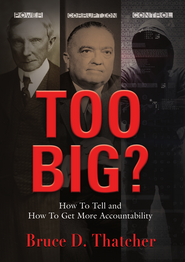

Practical Lessons From History, For Today





History Speaks Today is for all Americans who would influence public policy -- concerned citizens and students as well as politicians, professors and pundits. The books present a new way to teach and learn history and political science. Each volume addresses a single subject.
Subjects are chosen after careful consideration: empirical data are gathered, potential lessons hypothesized and then tested / modified through examination of historical situations. Those that pass historical scrutiny are presented as conclusions in HST books, including guidelines for public policy.
Individual volumes are organized in a consistent format. Each volume serves as a political science guide and reference that clearly articulates the lesson, presents at least five thoroughly-researched historical cases as validation, and concludes with a summary of what the lesson means for Americans, today. Questions To Consider are presented for each case to help readers probe more deeply into its relevance to today.
Some libraries have HST books. If yours doesn’t, ask them to include copies in their collection.
You can purchase HST books directly through Amazon, Barnes & Noble, Alibris, BooksAMillion, Xlibris, Lulu, and BookLocker.
You can also purchase HST books directly from this site.
Subject ideas may come from anyone, anywhere. They may be phrased in the form of specific lessons (e.g., "all truces will be broken", "never negotiate in public", "short-term always trumps long-term") or in terms of subjects such as "adamant aggressors," "immigration," "particularism," "government-sponsored research or exploration," etc.
Just about anything may be added to the potential subjects page for future consideration.
Five high-profile historical and current cases demonstrate where accountability was/is flawed or missing. The book shows how such people are not subjected to effective accountability. And it suggests remedies to improve accountability of those at the top of business, governmental and other organizations.
Cases include Robert Clive/East India Company, John D. Rockefeller/Standard Oil Company, Ralph J. Cordiner/General Electric Company, J. Edgar Hoover/Federal Bureau of Investigation, and Mark Zuckerberg/Facebook-Meta.
Personal weapons have been part of humankind since a rock was first used to kill an animal for food.
Today, as a core element of America’s culture, guns are used for hunting and sport and self protection ... and, unhappily, guns are involved in more deaths each year than are automobiles. How can this be changed?
Most nations that have ever been no longer exist. Each nation goes through a cycle of growth, maturity and decline beginning with values held by a critical mass of its people. As long as its populace accepts those values, the nation can endure. When they no longer accept them the nation declines and eventually dies.
Rise and Decline looks at six nations to learn how this cycle played out for four that no longer exist, to identify where the United Kingdom and United States stand in their cycles, and to suggest what must be done to retard or reverse their decline.
Immigration lays down the three essential elements that must be included for any immigration policy to be successful. It shows that America's first two immigration policies followed these guidelines and were eminently successful. America's present immigration practices violate all three guidelines.
Cases include United States of America, Mexico, Canada, Mandate Palestine, Australia, France, and Singapore.
This book presents three tests for identifying adamant aggressors and four guidelines for dealing with them. Cases include Mehmed II and The Ottoman Empire; James K. Polk and the USA; Adolph Hitler and Nazi Germany; Zionism, Chaim Weizmann, David Ben-Gurion and Israel; Joseph Stalin and Communist USSR.
These five cases are also available as separate e-book digests for busy readers.
History shows that initiatives are best financed by governments when perceived costs exceed perceived private returns. And the converse is also true: Initiatives are best eschewed by governments when potential private returns exceed perceived costs.
Read just the Preface and last chapter to get a complete articulation of the historical lessons.
To the Preface and last chapter, add the Executive Summaries preceding each case to see digests of how the lessons played out for the selected examples.
Read the whole book skipping the Executive Summaries. The historical narrative and Analysis and Discussion for each case add details and documentation to satisfy the most particular readers.
Buy These Great Books
You can purchase HST Books direct from this website. You can also get them from most online retailers and some public libraries.
Help HST choose subjects for future books by suggesting and communicating via email, or by leaving your comments.